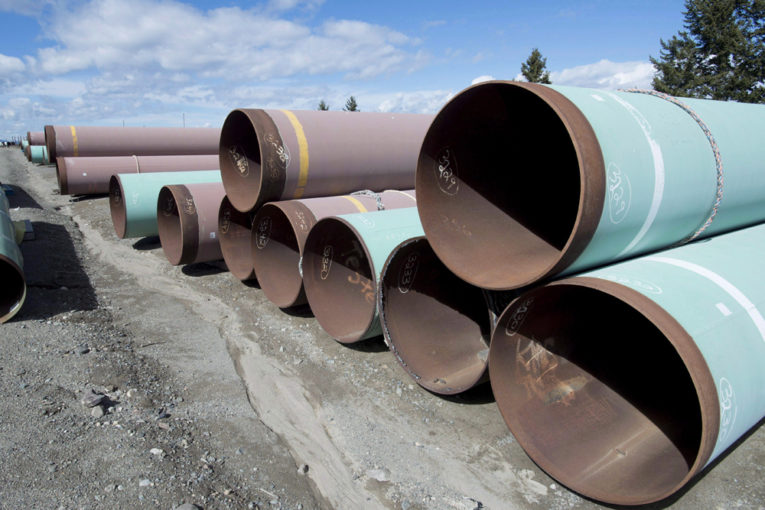
CALGARY/OTTAWA – A one-month delay by the federal government to decide on the Trans Mountain pipeline expansion will drive up the costs of the project in a tight labour market and at a time when the Canadian oil industry has lost patience with the federal government, industry executives say.
Natural Resources Minister Amarjeet Sohi announced Thursday the federal government would make its reconsideration decision on the Trans Mountain expansion pipeline project between Alberta and British Columbia on June 18 – roughly a month later than its previous deadline of May 22.
Sohi said that affected First Nations requested more time for consultations on the project’s impacts. “The government has consistently said that a decision would only be made on the project once we are satisfied that the duty to consult has been met,” he said in a release.
In Edmonton, Jason Kenney, the incoming premier, said Trudeau had notified him Wednesday of the impending delay.
“I agreed with the Prime Minister that they need to make sure that they cross every T and dot every I when it comes to the federal government’s duty to consult,” Kenney said. “We certainly don’t want them to have to go back to the drawing board a third time.”
Work stalled on the Trans Mountain project following a Federal Court of Appeal decision overturning approvals last year, but the company, which was bought by Ottawa from Kinder Morgan Ltd. for $4.5 billion, has said it will be prepared once a decision is made.
“While we await that decision, we will continue doing what we can to be poised to re-start the expansion project,” Trans Mountain Corp. president and CEO Ian Anderson said in a release.
Despite these assurances, oil executives are angry at continued delays from the federal government, which also extended its deadline for consultations the first time the project was approved only to have those approvals overturned in court.
But concerns are emerging that the labour market could tighten just as Trans Mountain construction is set to begin.
“When Trans Mountain gets going, there’s going to be a migration of workers away from other projects,” said Matthew Deeprose, president and CEO of Vault Pipelines Ltd.
Deeprose said delays in pipeline construction make it difficult for contractors and subcontractors to retain workers and therefore can cause price estimates to creep up. Vault is not among the contractors building Trans Mountain but the company has taken part in a number of other major projects such as Enbridge Inc.’s Line 3 project, which is also delayed.
“It’s a very tricky waiting game,” he said. “It’s a huge point of frustration no matter what your politics are.”
One high-level executive at a company building a portion of Trans Mountain said some subcontractors are beginning to second guess their Trans Mountain commitments as a number of other natural gas pipeline projects get underway.
“Some of them are contemplating should they even hang onto (their Trans Mountain subcontracts) because there’s so much other work coming up,” the person said.
Several natural gas pipeline projects by TransCanada Corp. including the Coastal GasLink and North Montney Mainline projects are expected to increase competition for skilled labourers, raising costs across the industry.
Leaders in the oil and gas industry blasted the most recent delay on Thursday and said they were running out of patience with Ottawa.
“It just seems that there is not a desire to move forward with this project,” said Tristan Goodman, president of the Calgary-based Explorers and Producers Association of Canada. “Setbacks now are unacceptable. This is not an acceptable result.”
Goodman said the government’s actions in delaying a decision contradict its public statements about understanding the importance of the project.
The government had fulfilled its obligations laid out by the Federal Court of Appeal and, at this point, there is a growing risk that construction on the project could be delayed beyond this year – which would drive up costs for the project, he said.
A report released in Jan. 2010 from the Parliamentary Budget Office found a one-year delay to the $9.3-billion project would reduce its value to the federal government by $693 million. The report also showed that costs could escalate to a total of $10.4 billion.
“We’re not going to have an industry to deal with if we keep this up,” Goodman said.
Construction on the project came to an abrupt halt at the end of August 2018, when the Federal Court of Appeal ruled the federal government had not properly consulted with First Nations and the pipeline regulator had failed to account for impacts on marine wildlife.
Eight months later on the heels of a fresh regulatory review and consultations, the industry is looking for the project to restart.
“We think this is a critical project for our industry and for Alberta,” Cenovus Energy Inc. spokesperson Brett Harris said. “It needs to go ahead as soon as possible.”
With a file from Tyler Dawson
• Email: [email protected] | Twitter: geoffreymorgan
• Email: [email protected] | Twitter: jesse_snyder
You can read more of the news on source
